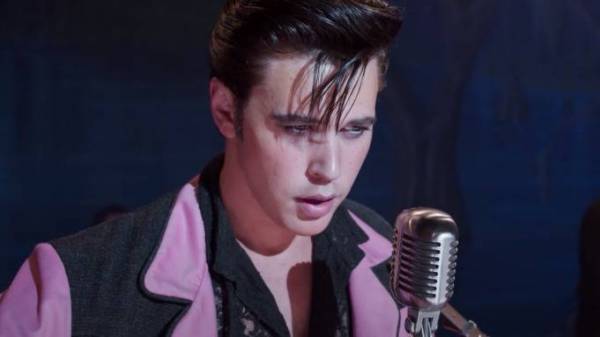Elvis, 2022.
Directed by Baz Luhrmann.
Starring Austin Butler, Tom Hanks, Olivia DeJonge, Dacre Montgomery, Kelvin Harrison Jr., Richard Roxburgh, Helen Thomson, Yola, David Wenham, Luke Bracey, Alex Radu, Alton Mason, Xavier Samuel, Kodi Smit-McPhee, Natasha Bassett, Leon Ford, Kate Mulvany, Gareth Davies, Charles Grounds, Josh McConville, Adam Dunn, Gary Clark Jr., Shonka Dukureh, and Charles Andre Allen.
SYNOPSIS:
From his childhood in Tupelo, Mississippi to his rise to stardom starting in Memphis, Tennessee and his conquering of Las Vegas, Nevada, Elvis Presley becomes the first rock ‘n roll star and changes the world with his music.
Elvis begins with what feels like a prank on the audience. Rather than centering its opening sequence on the King of Rock ‘n Roll Elvis Presley, narration kicks in of a cartoonishly evil-sounding carnival manager (that would go on to manage and repeatedly financially take advantage of the legend). He introduces himself as Colonel Tom Parker, jokingly announcing that this story is about him. Rest assured, the movie is primarily about Elvis, but it shouldn’t be put past Moulin Rouge and The Great Gatsby director Baz Luhrmann to pull that baffling bait and switch.
It would certainly make sense from a star power standpoint considering Colonel Tom Parker is played by the beloved Tom Hanks (caked in makeup and a fat suit while utilizing an indescribably disorienting voice that sounds more like Colonel Sanders, which eventually becomes a quick joke in the movie) and the little-known Austin Butler embodies Elvis Presley.
It’s also worth mentioning that throughout this opening, the visuals are chaotically trippy, flipping between time and locations (hospitals and casinos) in the vein of a near-death fever dream with an eye-rolling voiceover from Colonel Tom Parker painting himself out to be one of those iconic misunderstood movie villains that are getting a reboot to set the record straight favorably.
If you think a lot is going on in this sequence alone, multiply that times 159 minutes because there’s not a single shot in Elvis that isn’t dialed up to 11 regarding flash and style, sometimes over-directed (undeniably so in the third act, which goes on and on in a narrative circle that threatens never to end, and when it finally does, will have you thinking the sun might be out if you attended an evening screening).
The upside to this is a parade of Elvis covers Austin Butler, who does have a breakout performance, most notably when Baz Luhrmann is focused on the stage. Simply put, Austin Butler throws himself into the role of Elvis Presley physically with whiplash force, gyrating and pelvic thrusting and writhing around all over the floor, belting out iconic songs usually drenched in sweat with every woman in the audience swooning over his talent and magnetic, sexually suggestive presence, with some tossing their underwear up on stage.
Whether watching a young Elvis growing up in a Black neighborhood and becoming overcome with the power of gospel or infusing those styles into his work as a celebrated musician, the film certainly understands his cultural inspirations and how to transform that into a series of energetic musical numbers.
Unfortunately, this style leaves little room for substance, even if there is always something to appreciate about a biopic willing to go full-tilt crazy from the opening shot. The problem is that Elvis runs out of gas roughly 100 minutes in, looping back around into a situation that makes Elvis Presley look unbelievably gullible while also softening the impact of his failing marriage and battles with drug addiction.
Those last bits account for maybe 20 minutes of Elvis, so when the script from Baz Luhrmann, Sam Bromell, Craig Pearce, and Jeremy Doner attempts to be emotionally moving, it falls on deaf ears. The above is especially egregious during critical historical moments such as the death of Martin Luther King Jr., which affects Elvis Presley for all of 30 seconds before the film jumps back into another grand concert.
There are stretches of Elvis that do work, mainly after a narratively jumbled first act that soon settles into a rhythm dealing with Elvis Presley under threats of being canceled for his non-PG stage moves (at least according to government prudes that are also fighting for segregation). This behavior also places Colonel Tom Parker in the same crosshairs, forced to get control of his talent or face a different kind of wrath (a deceptive backstory is inevitably revealed).
With that in mind, the only scenes that muster up genuine involvement are the moments where Elvis Presley might defy these rules and anyone trying to restrict them from interacting with Black friends (Kelvin Harrison Jr. is sharp during a few short scenes portraying B.B. King) or performing the way he desires. Then there are a few introductory scenes with Priscilla Presley (Olivia DeJonge) that start sweet but hardly ever evolves into a love story deserving of playing ‘Can’t Help Falling in Love’ multiple times on the soundtrack.
That also leads to another significant gripe; not even the never-ending vortex of stylistic insanity from Baz Luhrmann covers up the fact that Elvis goes on far longer than necessary while taking forever to conclude (something that’s in stark contrast to the first act, which starts flying through Elvis Presley’s life like a Ferrari), the excitement of the musical performances and even hearing these songs wears its welcome. There is a brief period where it felt like Baz Luhrmann had ironed things out and found key story areas to focus on, but the third act bludgeons one into submission with shallow extravagance and repetitiveness.
But Austin Butler is going to be a star.
Flickering Myth Rating – Film: ★ ★ / Movie: ★ ★ ★
Robert Kojder is a member of the Chicago Film Critics Association and the Critics Choice Association. He is also the Flickering Myth Reviews Editor. Check here for new reviews, follow my Twitter or Letterboxd, or email me at MetalGearSolid719@gmail.com
















